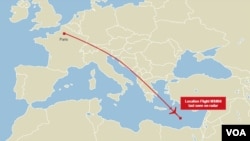Search teams in the Mediterranean continued to look Thursday for the EgyptAir jet believed to have crashed into the sea as it approached Cairo on a flight from Paris.
Earlier reports that the plane's wreckage had been located near a Greek island were incorrect. Authorities said late Thursday that they had not confirmed that any debris from the plane had been found.
Egypt said terrorism was a more likely cause of the disaster than technical failure, but no definitive information was available.
EgyptAir said the Airbus A320, with 66 people on board, disappeared from radar about 2:30 a.m. Cairo time, when it was 11,000 meters above the Mediterranean, and just 16 kilometers inside Egyptian airspace.
In Cairo, Egyptian Aviation Minister Sherif Fathy said France would be responsible for any security lapse if terrorism was found to be the cause of the crash.
Fathy also offered the theory that terrorism loomed larger than mechanical problems as the possible cause of the crash.
“If it is proven that this was an act of sabotage, then we have to know and recognize that this plane originated from France and not from Egypt,” he said.
In the U.S., President Barack Obama was briefed on the latest developments at the White House.
Spokesman Josh Earnest offered U.S. condolences over the disaster but stressed it was too early to say what had caused the crash.
Aviation experts warned against speculation, reiterating that too little was known to draw any conclusions.
Plane's flight path
“I will say that when an airplane disappears at 37,000 feet, it’s a highly unusual event," Scott Hamilton of Leeham Aviation Consultancy told VOA.
"It either typically indicates a catastrophic failure, catastrophic emergency of some kind, or as we know from not too long ago, a bomb could go off. ... But you just have to be cautious and not jump to any conclusions at this point," Hamilton said.
He explained that search teams "would be ultimately looking for the airplane's main records and black boxes."
Fred Burton of the U.S.-based global intelligence company Stratfor tweeted: "Mechanical failure at cruising altitude is unlikely. Such an event typically occurs at takeoff or landing."
Fifty-six passengers were on board, including one child and two infants, from France, Britain, Egypt, Iraq, Kuwait, Saudi Arabia, Sudan, Chad, Portugal, Algeria and Canada. No U.S. citizens were reported among the missing.
At the Cairo airport, anxious relatives of the ill-fated plane's passengers anxiously awaited news about their loved ones.
EgyptAir sent translators and doctors to the airport to meet with the passengers' families.
The disappearance has renewed security concerns months after a Russian passenger plane was shot down over the Sinai Peninsula.
The Russian plane crashed in Sinai on October 31, killing all 224 people on board.
WATCH: Relatives of EgyptAir passengers struggle for information
Moscow said it was brought down by an explosive device, and a local branch of the extremist Islamic State group claimed responsibility for planting it.
In 1999, EgyptAir Flight 1990 crashed into the Atlantic Ocean near the island of Nantucket, off the coast of the U.S. state of Massachusetts, killing all 217 people aboard.
U.S. investigators filed a final report that concluded its co-pilot had switched off the autopilot and pointed the Boeing 767 downward. But Egyptian officials rejected the notion of suicide, insisting some mechanical reason caused the crash.
Additional reporting by Victor Beattie in Washington, Jeff Seldin at the Pentagon and Steve Herman in Bangkok.











